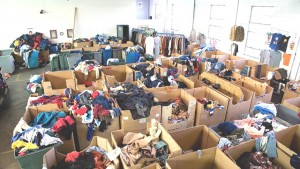US clothing lobby claims $125m at stake in East Africa

SMART also represents the thousands of sorters whose job is to turn a room of jumbled and discarded items into future cash returns.
July 25—A used clothing lobby group that wants the United States government to penalize Rwanda, Tanzania and Uganda, if the three countries impose a total ban on second hand clothing and footwear by 2019, says $125 million annually is at stake.
The deadline for filing of all correspondence including mitigating evidence from the East Africans was last Friday although all three countries and the EAC Secretariat submitted written explanations long before then. A senior official with the trade ministry in Kampala said, “We feel that this whole thing has been blown out of proportion. How do they expect us to get any space on the Global Value Chain when you forcefully throw second hand clothing at us? There is some double standards here,” he told 256BN.
The threat hanging over Rwanda, Tanzania and Uganda is having some of their privileges under the African Growth and Opportunity Act (AGOA) revoked. Basically, this will mean much stiffer terms for exporting goods to the US market.
Testifying before officials of the Office of the United States Trade Representative (USTR) in Washington D.C. recently, the Secondary Materials and Recycled Textiles Association (SMART) said a ban is a clear barrier to free trade and would hurt both American business and their African customers. This is why in March last year, SMART petitioned the USTR to have an out-of-cycle review of three countries’ AGOA eligibility.
SMART quotes Section 104 of the AGOA Act. This includes requirements that the beneficiary country has established or is making continual progress toward establishing: a market-based economy; the rule of law, political pluralism, and the right to due process; the elimination of barriers to US trade and investment; economic policies to reduce poverty; a system to combat corruption and bribery; and the protection of internationally recognized worker rights. In addition, the country may not engage in activities that undermine US national security or foreign policy interests or engage in gross violations of internationally recognized human rights.
SMART representatives said industry-wide, there are at least 40,000 US jobs within the private sector and another 150,000 jobs in the not-for-profit sector that stand to be negatively impacted by an East African import ban. The estimated value of US-sourced used clothing that flows through third countries into Tanzania, Rwanda, Uganda and Kenya is $100 million. SMART claim the total value of exports to the EAC represents $124 million, or about 22%, of the US industry’s total used clothing exports.
Jackie King, the SMART Executive Director said, “We are grateful for USTR’s diligence in ensuring AGOA eligibility standards are met. For so many in these countries who are existing on the equivalent of $1 to $2 or less per day, secondhand clothing and shoes provide their only meaningful access to quality apparel.’
SMART represents numerous small and medium-sized member companies who use, convert and recycle pre-and post-consumer textiles, including used clothing. “ We are now awaiting a final determination from the US government, and it is our hope that a resolution can be reached with all the EAC member countries to benefit our industry as well as the people of the EAC,” King told the USTR panel.
In February 2016, the East African Community (EAC) Summit, endorsed a decision to phase out imports of used clothing and footwear eventually leading to a complete ban by 2019. In the meantime, importers of second hand clothing have had to pay higher taxes.
However earlier this year, Kenya backed out of the agreement when it became clear the US government would retaliate by denying Kenyan garment exporters access to the American market under AGOA.
SMART representatives clarified that their request is for a suspension of duty-free status for all currently eligible apparel imports from these countries, rather than a request that any EAC countries be removed from AGOA beneficiary status.
AGOA allows duty/quota free access to the US market. Of all six countries in the EAC, Kenya is a biggest beneficiary of AGOA with exports of garments mainly from its EPZs nearly topping $400 million in 2016. Even if one were to total all the AGOA exports of Rwanda, South Sudan, Tanzania and Uganda, the figure is not even a fifth of Kenya’s receipts.
SMART says higher taxes on used items has led to a marked decline in business with EAC member countries and a corresponding fall in employment within the United States. Referring to a survey it did, SMART claims 40% of respondents have reduced employment by at least 25% since the 2016 tariff increases.
Some 88% of survey respondents have experienced a revenue reduction of at least 25% since the tariff increases. More than 52% of survey respondents say they would be forced to reduce their number of employees by at least 50% if the full ban were implemented. More than 94% of survey respondents said a full ban would cause them to experience a 25% to 75% reduction of revenues.


 African Heads of state head to South Korea next week for Summit talks
African Heads of state head to South Korea next week for Summit talks
 Trading leads as main source of income for Ugandans
Trading leads as main source of income for Ugandans
 New leadership for bankers’ umbrella as total assets top $12 billion
New leadership for bankers’ umbrella as total assets top $12 billion
 Brussels Airlines to announce Nairobi service
Brussels Airlines to announce Nairobi service
 SITA promises enhanced travel experience after Materna acquisition
SITA promises enhanced travel experience after Materna acquisition
 Saudia’s 105 aircraft order stretches A320neo lead over rival Max
Saudia’s 105 aircraft order stretches A320neo lead over rival Max
